Top 10 Energy Supplements for Boosting Energy and Focus in 2025
Boost your energy and focus with our guide to the top energy supplements in 2025. We cover the best energy supplements – from vitamins and minerals to adaptogens – for sustained energy and mental clarity.
Table of Contents
Maintaining mental clarity and sustained energy is more important than ever as we juggle busy schedules and endless distractions. Think of your brain like a smartphone – it needs a charged battery to function. The right energy supplement can be that extra “charge” that keeps you sharp and alert. In fact, studies show that about 45% of Americans report persistent fatigue, and nearly 30% of supplement users take them specifically to boost energy. With so many options on the market, choosing the best supplements for energy and focus can feel overwhelming. That’s why we’ve researched the latest science and trends to bring you the top 10 energy supplements of 2025. These picks – from vitamins and minerals to herbal nootropics – are backed by research and popular demand (the nootropics market is a $10+ billion industry and growing). We’ll explain how each works, use analogies to simplify complex ideas, and even include placeholder spots for affiliate product links.
1. Caffeine + L-Theanine – A Focus and Energy Power Pair
Everyone knows caffeine (in coffee or tea) can perk you up, but when combined with L-theanine (a calming amino acid found in tea), you get a smoother boost of focus. Caffeine is like hitting the gas pedal – it revs up alertness – but L-theanine is like a fine-tuned suspension that smooths out jitters. Research suggests this combo improves attention and cognition without the crash. One small study found that tea containing both caffeine and L-theanine significantly improved alertness and task accuracy. In practice, this means you can power through a morning meeting or study session with laser-like focus.
- Benefits: Increases alertness and mental focus, reduces stress and jitteriness, often leads to a calm yet energetic state.
- Real-world Example: Think of caffeine as the engine’s fuel, and L-theanine as the engine’s oil. Together, they make the car run smoothly and powerfully.
- Usage: Best taken in the morning or early afternoon (avoid late-day use to protect sleep). You can get L-theanine from green tea or supplements, often paired with a cup of coffee.
Shop a trusted caffeine + L-theanine supplement.
2. B-Vitamins (B12, B6, B5, etc.) – Spark Plugs for Your Energy Metabolism
The B-complex vitamins (especially B12, B6, B5, niacin and folate) are essential “spark plugs” in our cells’ engine. Our bodies use B vitamins to convert the food we eat into adenosine triphosphate (ATP) – the actual chemical energy that fuels every cell. In fact, Medical News Today notes that B-vitamins help “release energy from food,” and deficiencies in B vitamins are a common cause of fatigue. Without enough B12 (cobalamin), for example, your body can’t make DNA or red blood cells properly, leading to sluggishness and brain fog.
- Benefits: Supports metabolism, oxygen transport, and brain function. Can improve energy levels and mood if you’re low in B vitamins.
- Who Needs It: Vegans, vegetarians, older adults, and people on certain meds often lack B12. If you aren’t getting enough through diet (meat, dairy, leafy greens), a B-complex supplement can re-charge your system.
- Analogies: Think of B vitamins as the spark plugs or ignition wires of your cellular engine – without them, the engine misfires.
- Caution: If you already have normal B levels, extra B12 may not give you extra energy. Your body simply excretes what it doesn’t need.
Shop high-quality B-complex vitamins.
3. Iron – Oxygen’s Best Friend
Iron is a mineral crucial for carrying oxygen in your blood. It’s like the fuel pump that delivers oxygen “fuel” to your muscles and brain. If iron is low, hemoglobin levels drop and your body can’t get enough oxygen – leading to classic fatigue and weakness. Indeed, Medical News Today confirms that iron deficiency “can lead to a lack of energy and fatigue,” especially in women, who lose blood monthly and are more prone to low iron. Good news: correcting an iron deficiency often brings a noticeable energy boost.
- Benefits: Improves red blood cell health and oxygen delivery, directly combating tiredness.
- Who Needs It: Women of childbearing age, vegetarians/vegans, people with heavy exercise schedules, or anyone diagnosed with anemia. We women often overlook iron, but it’s vital – studies show about 11% of US women have low iron.
- Real-world Example: Imagine trying to run a marathon with half a lung – that’s how your body feels with low iron. Supplementing iron is like opening a new air intake: suddenly everything runs more efficiently.
- Caution: Iron supplements should only be taken if a blood test shows you’re low. Too much iron can cause stomach upset or be toxic. Always pair iron with vitamin C (like citrus or berries) for better absorption.
Shop iron supplements (Note: consult your doctor first).
4. Coenzyme Q10 (CoQ10) – The Cellular Spark Charger
CoQ10 is a vitamin-like antioxidant found in every cell, especially in the heart, liver and muscles. It’s a co-factor in the mitochondria – the powerplants of cells – helping create ATP, our energy currency. Think of CoQ10 as the ignition battery inside each cell. Research has found that CoQ10 can significantly reduce fatigue: a review of 13 trials showed that it “had a significant effect on reducing fatigue levels” in both healthy people and those with chronic illness.
- Benefits: Boosts cellular energy production, especially in muscles and heart; protects cells from oxidative stress.
- Evidence: Studies report improved energy and reduced fatigue. One review found that supplementing CoQ10 helped people report less fatigue even when it took a few months to build up.
- Analogy: CoQ10 is like an extra-long battery cable for your cells – it ensures your mitochondria (generators) are fully powered and can charge up quickly.
- Usage: Usually taken daily (often with meals). It’s found in meats and fish, but supplements give a concentrated dose.
5. Ashwagandha – The Stress-Calming Energy Adaptogen
Ashwagandha is an ancient Ayurvedic herb known as an adaptogen – it helps the body handle stress. Stress and anxiety can leave us feeling drained, so by lowering stress hormones and improving sleep, ashwagandha indirectly boosts energy and mental clarity. Medical news confirms that Ashwagandha “could help boost energy levels, improve sleep, and reduce stress”. In one study of college students, those taking ashwagandha twice daily reported better mental clarity, sustained energy, and more restful sleep than the placebo group.
- Benefits: Reduces cortisol (stress hormone), improves sleep quality, and supports recovery – all leading to higher daytime energy.
- Real-world Example: Imagine your stress as a phone app running in the background draining your battery. Ashwagandha effectively closes that app, leaving more battery (energy) for what really matters.
- Caution: Commonly safe, but check for interactions (it can affect thyroid, hormone levels in rare cases). Start with a moderate dose.
6. Rhodiola Rosea – The Endurance and Mood Tonic
Rhodiola is a flowering plant that grows in cold regions, long used by soldiers and athletes to endure physical and mental strain. It’s another adaptogen. As NIH notes, people primarily use rhodiola for “increased energy, stamina, strength, and mental capacity”. In one trial, participants taking 400 mg daily for 12 weeks saw significant improvements in stress-related fatigue and mood. In practice, Rhodiola feels like an instant resilience booster – perfect for a mid-afternoon slump or before a stressful deadline.
- Benefits: Enhances physical stamina and mental endurance, combats fatigue under stress.
- Who Should Try It: Ideal for those with busy, high-pressure lifestyles (think students during finals or executives before presentations).
- Analogy: Rhodiola is like having a little extra oxygen tank when climbing a mountain – you can climb higher without running out of breath.
- Usage: Best on an empty stomach in the morning or early afternoon (it can be mildly stimulating).
Shop Rhodiola Rosea supplements.
7. Creatine – More Than a Muscle Maker
Most people know creatine as a bodybuilding supplement, but it also benefits brain and body energy. Creatine helps regenerate ATP quickly, fueling short bursts of effort. It’s made in the body and stored in muscles, but extra can raise energy stores. Research shows creatine not only improves physical performance, but also “can improve symptoms of mental fatigue and enhance memory and cognition”. In one study, healthy adults taking creatine performed better on demanding brain tasks and felt mentally sharper.
- Benefits: Increases rapid energy availability in muscles and brain; may reduce brain fog.
- Real-world Example: If your energy reserves are like batteries, creatine adds a second battery pack, so you can sprint longer and think faster.
- Usage: Typically 3–5 grams daily (often loaded initially). Mix into water or a smoothie.
8. Omega-3 Fatty Acids – Healthy Fats for Brain Fuel
Omega-3s (especially DHA) are essential fats that make up a large part of our brain cell membranes. They keep neurons flexible and efficient. A review of 38 studies found that omega-3 supplementation supports cognitive performance in older adults and may delay mental decline. In simpler terms, healthy fats like omega-3s are the engine oil for your brain – without them, everything runs more sluggishly. Omega-3s also reduce inflammation, which can improve mood and general vitality.
- Benefits: Enhances memory and focus, stabilizes mood, and promotes brain health – all contributing to better mental energy and clarity.
- Sources: Fatty fish (salmon, sardines), algae oil (vegan DHA), walnuts, flaxseeds. Supplements (fish oil or algae-based) ensure you get enough.
- Analogy: Think of omega-3 as the high-grade oil that keeps your brain’s gears running smoothly under pressure.
Shop Omega-3 (fish oil or algae oil).
9. Lion’s Mane Mushroom – The Nerve Growth Booster
Lion’s Mane is a medicinal mushroom gaining popularity as a nootropic. It’s known for promoting nerve growth factor (NGF) – a protein that helps neurons grow and repair. In one double-blind study, older adults taking lion’s mane daily showed statistically significant improvements in cognitive function after just 16 weeks. We can view lion’s mane as a “brain gardener,” helping your neural network flourish. Users often report sharper memory, better focus, and even reduced anxiety after consistent use.
- Benefits: Supports memory, focus, and neuroplasticity. Many use it in conjunction with caffeine for an extra boost (LA Times notes it’s often paired with caffeine for anxiety reduction and attention).
- Usage: Available as powdered supplement, capsules, or brewed as tea.
- Real-world Example: If your brain is like a forest, lion’s mane helps it regrow and clear new paths so thoughts flow more freely.
10. Magnesium (L-Threonate) – Calming Recharge for Mind & Body
Magnesium is involved in 300+ biochemical reactions, including many in energy production. An imbalance in magnesium can literally make you feel drained. Medical sources note that magnesium “regulates biochemical reactions… including energy production, so an imbalance may lead to a lack of energy”. We like magnesium L-threonate for brain support: unlike regular magnesium, it crosses into the brain and can improve synaptic function and sleep. Good sleep is a cornerstone of sustained energy, so by helping you rest better, magnesium indirectly boosts daytime alertness.
- Benefits: Improves sleep quality, supports nerve function and relaxation, aids memory. The L-threonate form specifically targets cognitive clarity.
- Who Needs It: Many people are mildly deficient in magnesium (leg cramps, headaches, insomnia are common signs). Even a little supplement (100–200 mg in evening) can help.
- Analogy: Magnesium is like the oil that allows your brain’s engine to cool down and function smoothly at night, so it’s fully charged in the morning.
Shop Magnesium L-Threonate supplements.
FAQ – Your Energy & Focus Questions Answered
Q: What are the best energy supplements to increase energy levels?
A: The best energy supplements often combine vitamins, minerals, and adaptogens. Top picks include B-vitamins (for metabolism), iron (if you’re anemic), coenzyme Q10, and adaptogens like ashwagandha or rhodiola. For example, GoodRx notes that low levels of B vitamins, vitamin D, or iron can cause fatigue, and supplements in these nutrients help only if you’re deficient. Ginseng, CoQ10, and ashwagandha have evidence to improve energy in people with fatigue. We always say: focus first on diet, sleep, and exercise, but these supplements can give you an extra edge when you need it.
Q: How can I improve focus and cognitive clarity?
A: Several of the supplements above also boost focus. Caffeine + L-theanine is a proven combo to sharpen attention. Lion’s Mane mushroom has studies showing it significantly improved cognitive function in 16 weeks. Omega-3s and magnesium L-threonate help memory and learning as well. Think of these as brain-support supplements: they fuel neurotransmitters and protect neurons, so your mind stays clear and alert.
Q: Are there energy supplements specifically for women (or men)?
A: The core supplements are similar, but women often need to watch iron and B12 more closely. Premenopausal women are at higher risk of iron deficiency, so an iron supplement can be a game-changer if blood tests confirm low levels. Men generally have more muscle mass, so creatine might benefit them more (it’s great for muscle and brain). Of course, everyone can benefit from B-complex, vitamin D, magnesium, and adaptogens. When in doubt, we recommend getting a blood test and consulting a doc – then supplement specifically for your needs.
Q: Can supplements really give you natural energy?
A: Yes – many of the supplements listed are “natural” in the sense that they’re vitamins, minerals, or plant extracts. Adaptogens like ashwagandha and rhodiola are herbs used for centuries. B-vitamins and CoQ10 are naturally occurring (you get some from food). Even caffeine in coffee is natural, and L-theanine comes from tea. These work with your body’s biology to release energy or improve focus, rather than a quick jitters-from-energy-drinks effect. We always advise looking for healthy energy supplements (like whole-food vitamins or clinically studied extracts) rather than relying on high-sugar energy drinks or untested products.
Q: Does Vitamin B12 give you energy?
A: B12 is essential for energy production – if you’re deficient, supplementing it will likely reduce fatigue and increase energy. However, as GoodRx explains, if your B12 levels are already normal, taking extra B12 probably won’t make you feel more energetic. In short: B12 can give you energy if you needed it, but it’s not a stimulant. We always suggest checking your levels. Vegans and older adults in particular should ensure adequate B12 intake.
Q: How do I choose safe supplements for energy and focus?
A: We recommend looking for high-quality brands that third-party test their products. Check that doses match clinical studies and avoid mega-doses unless advised by a doctor. For example, LA Times advises making sure ingredients are in research-supported amounts and avoiding the “fairy dust” approach. Always start one supplement at a time, so you can notice any benefits or side effects. And remember: supplements are not magic pills. They work best when paired with good sleep, nutrition, exercise, and stress management.
We hope this guide helps you find the right energy supplement for your needs. By combining these evidence-backed options with a healthy lifestyle, we know you can power through your days with clear focus and sustained vitality.









